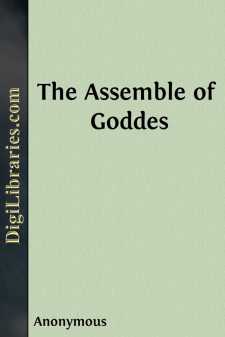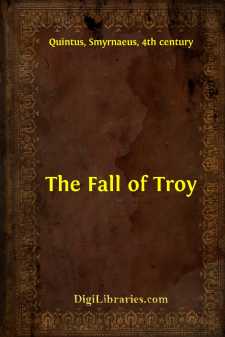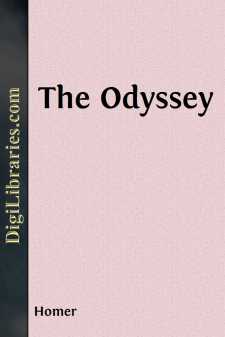Poetry
- American 96
- Ancient, Classical & Medieval
- Asian 15
- Australian & Oceanian 11
- Canadian 11
- Caribbean & Latin American 5
- Children's Poetry & Nursery rhymes 51
- Continental European 11
- English, Irish, Scottish, Welsh 162
- General 483
- Inspirational & Religious 7
- Middle Eastern 3
Ancient, Classical & Medieval Books
Sort by:
INTRODUCTION The impersonal character of the Homeric poems has left us entirely in the dark as to the birthplace, the history, and the date, of their author. So complete is the darkness which surrounds the name of Homer that his very existence has been disputed, and his works have been declared to be an ingenious compilation, drawn from the productions of a multitude of singers. It is not my intention...
more...
by:
Anonymous
P. DUJARDINHere foloweth the Interpretacoin of the namesof goddes and goddesses as is rehercedin this tretyse folowynge as Poetes wryte¶ Phebus is as moche to saye as the Sonne.¶ Apollo is the same or elles God of syght.¶ MorpleusShewer of dremis¶ PlutoGod of hell.¶ MynosIuge of hell.¶ CerberusPorter of hell.¶ Colus the wynde or God of the Eyre.¶ Dyana Goddesse of wode and chase.¶ Phebe the...
more...
Homer's "Iliad" begins towards the close of the last of the ten years of the Trojan War: its incidents extend over some fifty days only, and it ends with the burial of Hector. The things which came before and after were told by other bards, who between them narrated the whole "cycle" of the events of the war, and so were called the Cyclic Poets. Of their works none have survived;...
more...
HOMER'S ODYSSEY. BOOK FIRST—INTRODUCTION. The Odyssey starts by organizing itself; it maps out its own structure in what may be called a General Introduction. Herein lies a significant difference between it and the Iliad, which has simply an Invocation to the Muse, and then leaps into the thick of the action. The Iliad, accordingly, does not formulate its own organization, which fact has been...
more...
by:
John Milton
THE FIRST BOOK I, WHO erewhile the happy Garden sung By one man's disobedience lost, now sing Recovered Paradise to all mankind, By one man's firm obedience fully tried Through all temptation, and the Tempter foiled In all his wiles, defeated and repulsed, And Eden raised in the waste Wilderness. Thou Spirit, who led'st this glorious Eremite Into the...
more...
by:
Homer
INTRODUCTION Scepticism is as much the result of knowledge, as knowledge is of scepticism. To be content with what we at present know, is, for the most part, to shut our ears against conviction; since, from the very gradual character of our education, we must continually forget, and emancipate ourselves from, knowledge previously acquired; we must set aside old notions and embrace fresh ones; and, as...
more...
ARGUMENT. Apollo, enraged at the insult offered to his priest, Chryses, sends a pestilence upon the Greeks. A council is called, and Agamemnon, being compelled to restore the daughter of Chryses, whom he had taken from him, in revenge deprives Achilles of Hippodameia. Achilles resigns her, but refuses to aid the Greeks in battle, and at his request, his mother, Thetis, petitions Jove to honour her...
more...
by:
Edward Fairfax
THE ARGUMENT. God sends his angel to Tortosa down, Godfrey unites the Christian Peers and Knights; And all the Lords and Princes of renown Choose him their Duke, to rule the wares and fights. He mustereth all his host, whose number known, He sends them to the fort that Sion hights; The aged tyrant Juda's land that guides, In fear and trouble, to resist provides....
more...
THE NIBELUNGENLIED (1) ADVENTURE I (2) Full many a wonder is told us in stories old, of heroes worthy of praise, of hardships dire, of joy and feasting, of the fighting of bold warriors, of weeping and of wailing; now ye may hear wonders told. In Burgundy there grew so noble a maid that in all the lands none fairer might there be. Kriemhild (3) was she called; a comely woman she became, for whose sake...
more...











